Introduction: Exploring the Concept of Holistic Wellness
Are you tired of quick fixes to health problems that don’t provide lasting solutions? Do you wish to understand and nurture your physical and mental wellbeing on a broader and deeper level? You’ve come to the right place! The notion of holistic wellness is a guiding principle for those seeking to cultivate a balanced, healthy, and satisfying life. This article delves into the intricacies of holistic wellness, underscoring its key components and showcasing how it can be integrated into every facet of your life.
- The concept of holistic wellness transcends the traditional health care approach, emphasizing the importance of the interplay between physical and mental health.
- Understanding the mind-body connection offers new dimensions to our perspective of health and wellness.
- We dive deeper into the holistic practices for mental wellness like meditation, mindfulness, and yoga that help maintain a calm and centered mind.
But that’s not all! We also explore:
- The role of nutrition and diet in fueling both your body and mind for optimal health.
- The integral part exercise plays in improving not only physical, but mental health and wellbeing.
- Holistic approaches to stress management, providing you the techniques to build relaxation and resilience.
- The undeniable importance of quality sleep and its impact on mental clarity and physical recovery.
- And finally, the nurturing impact of supportive relationships and community for your overall social wellbeing.
As we journey through the facets of holistic approaches to mental and physical wellness, we hope to empower you with comprehensive knowledge and understanding towards a balanced and healthy life. So, buckle up for an enlighting voyage exploring the beauty of holistic wellness!
Let’s get started.
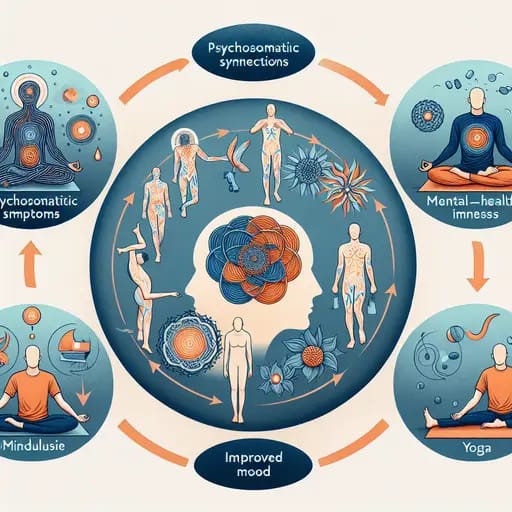
The Mind-Body Connection: Understanding How Mental and Physical Health Interact
Our mental and physical health do not exist in separate silos; they’re profoundly interconnected, influencing and feeding off each other in a continuous cycle. This simultaneous interaction is known as the mind-body connection. Understanding the depth of this connection opens up avenues for more holistic approaches to overall wellness.
- Psychosomatic Symptoms: The emotional distress associated with mental health problems can manifest as physical symptoms, such as headaches, stomach problems, chronic pain, and more.
- Physical Illness and Mental Health: Conversely, individuals living with chronic physical conditions often experience mental health issues, such as depression and anxiety. Managing these physical diseases can be stressful, leading to emotional distress.
- Impact of Mental State on Immunity:Your mental state can also impact your immunity. Long-term stress or trauma weakens the immune system, making you more susceptible to infections and diseases.
- Role of Exercise: Engaging in regular physical activity is not only beneficial for physical health but also fosters mental wellbeing. It instigates the release of endorphins—soccer referred to as ‘feel-good hormones,’ which reduces stress and improves mood.
Given the deep links between mind and body, it’s clear that a comprehensive plan for health should address both mental and physical aspects. Let’s delve deeper into the impact of holistic practices on mental wellness.
- Meditation: Regular meditation helps lower stress levels, improves cognitive functioning and strengthens your emotional health.
- Mindfulness: Mindfulness involves being fully present at the moment and open to it. Consistent practice improves both mental and physical health, enhancing overall quality of life.
- Yoga: Integrating mind and body, yoga can boost mental health by reducing stress, enhancing mood, improving sleep, and increasing overall sense of well-being.
In conclusion, adopting a holistic approach that incorporates mindfulness, diet, exercise, and stress management techniques can significantly boost both our mental and physical health and contribute to overall wellness.
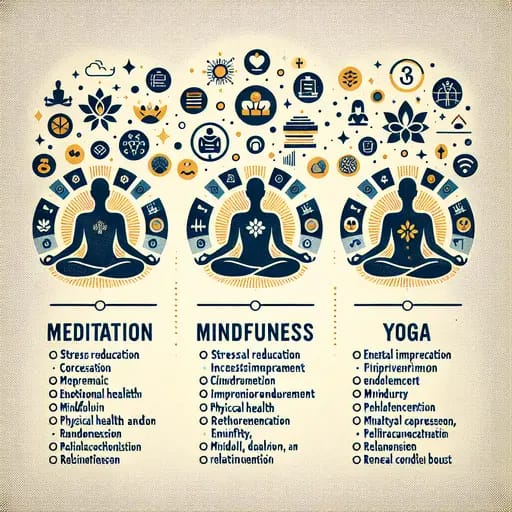
Holistic Practices for Mental Wellness: Meditation, Mindfulness, and Yoga
Improving mental wellness is paramount for a holistic approach to health, and meditation, mindfulness, and yoga are among the widely accepted practices for achieving this. Unlike conventional treatments that target specific symptoms, holistic practices aim to restore balance and promote overall well-being by focusing on the body, mind, and spirit.
Maintaining good mental health is essential for a vibrant, energetic lifestyle. Moreover, it has a significant effect on our physical health, aiding in the prevention of chronic diseases and improving life quality. Let’s dive in and explore how meditation, mindfulness, and yoga contribute to mental wellness.
Meditation
- Stress reduction: Regular meditation can lower stress levels by reducing the production of the stress-related hormone cortisol.
- Improved concentration: By encouraging a heightened state of awareness, meditation helps enhance focus and concentration.
- Enhanced self-awareness: Meditation helps us better understand ourselves, fostering complete self-acceptance and promoting healthy self-esteem.
Mindfulness
- Increased emotional health: Mindfulness increases positivity, affirming constructive emotions while reducing adverse emotional reactions and stress.
- Improved physical health: As a complement to other holistic practices, mindfulness contributes to a healthier cardiovascular system, alleviates chronic pain, regulates blood pressure, improves sleep, and promotes gastrointestinal health.
- Enhanced relationships: Mindfulness increases our awareness and understanding of others’ emotions, leading to healthier and more fulfilling relationships.
Yoga
- Reduction in anxiety and depression: Yoga has been shown to lessen the symptoms of anxiety and depression, making it an essential part of a holistic approach to mental wellness.
- Mental clarity and calmness: By promoting relaxation, yoga helps build mental clarity and calmness, boosts body awareness, relieves chronic stress patterns, and relaxes the mind.
- Increased self-confidence: Yoga, through its body-positive practices, can foster improved self-image and boost self-confidence.
Whether it’s through meditation, mindfulness, or yoga, holistic practices offer an all-rounded approach to overall mental wellness. These practices encourage balance and connection, helping individuals to lead healthier, more fulfilled lives.
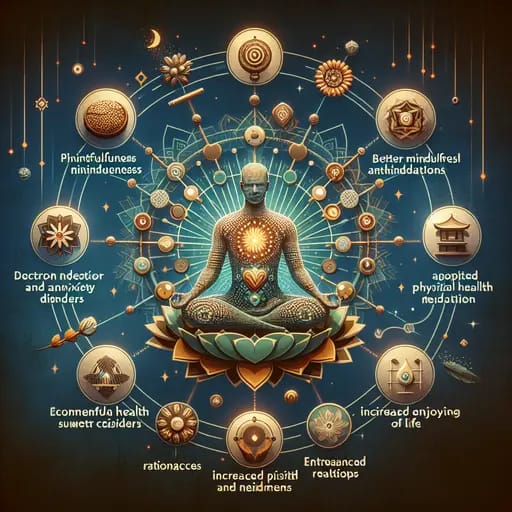
Mindfulness: Embrace the Present for a Healthier Mind and Body
Within the framework of holistic health, one key practice stands out—Mindfulness. The concept of mindfulness is deeply rooted in ancient traditions, but has been modernized and adapted to our fast-paced lives. This section explores the benefits and practices of mindfulness which is an essential part of our journey towards mental and physical wellness.
Experts have touted mindfulness as the secret to managing stress and cultivating mental balance. Let’s delve into this powerful holistic practice.
The Definition and Importance of Mindfulness
‘Mindfulness’ is a term you’ve likely heard, but what does it truly mean? In essence, mindfulness is a mental practice that allows us to focus intentionally on the present moment, acknowledging and accepting what we feel, think, and sense with a non-judgmental approach. Integrating regular mindfulness practices can lead to:
- Improved mental health: It reduces symptoms of depression and anxiety disorders.
- Better stress management: Mindfulness is a powerful tool that helps us cope with daily pressures and stressors.
- Enhanced physical health: It can help alleviate physical health conditions such as heart disease and chronic pain.
- Improved overall wellbeing: Practicing mindfulness improves attention spans, enhances relationships, and increases our capacity to enjoy life.
Practical Ways to Incorporate Mindfulness into Daily Life
Though the concept of mindfulness might seem abstract, there are practical methods to incorporate mindfulness into your life:
- Practice mindful breathing: Focusing on your own breath – its rhythm, pace and movement, can promote a state of calmness and attentiveness.
- Engage in mindful eating: Pay careful attention to the experience of eating, the taste, texture, and aroma of your food.
- Perform a body scan meditation: A systematic check-up through your entire body, focusing on how each part feels. It helps us to reconnect with our physical presence.
Encouraging the practice of mindfulness can lead to significant improvements in both mental and physical health. By directing our awareness to the present, we develop a more empathetic relationship with ourselves, enhancing our overall wellness in the process.
In conjunction with techniques such as meditation and yoga, mindfulness forms the cornerstone of holistic mental wellness.

Holistic Practices for Mental Wellness: Meditation, Mindfulness, and Yoga
Holistic health is about taking care of the whole self – physically, emotionally, and mentally. When speaking of mental wellness, three practices are often cited for their benefits: meditation, mindfulness, and yoga.
1. Meditation
Meditation is a practice dating back thousands of years and can work wonders for your mind. It promotes the development of inner peace, concentration, and mental clarity. Here are some key points to consider:
- Can help reduce anxiety and stress.
- Improves concentration and foster clear thinking.
- Promotes self-awareness and spiritual growth.
- Provides mental and emotional balance.
2. Mindfulness
Mindfulness is a form of meditation in which you focus on being intensely aware of what you’re sensing and feeling at the moment, without interpretation or judgment. Practicing mindfulness can give you more cognitive flexibility and emotional stability:
- Increases self-compassion.
- Helps manage depression.
- Enhances brain function and memory.
3. Yoga
Yoga is a psycho-physical discipline that was developed in ancient India. As a holistic practice for mental wellness, it involves physical poses, breathing exercises, meditation, and ethical living:
- Promotes mental health and eases stress.
- Increases body awareness.
- Enhances mindfulness and spiritual growth.
Holistic practices for mental wellness is not some mystical notion hidden away in ancient texts, it’s a modern science of creating a healthy mind in a healthy body. Incorporating meditation, mindfulness, and yoga as part of your daily lifestyle helps to create an inner environment of tranquility, serenity, and peace.
Remember, sustained practice and regularity in timing are key in order to reap the full rewards of adopting these practices. This not only requires dedication and determination but also a conducive environment that encourages such behavior. So, let’s make it happen! You have the tools; it’s time to utilize them.
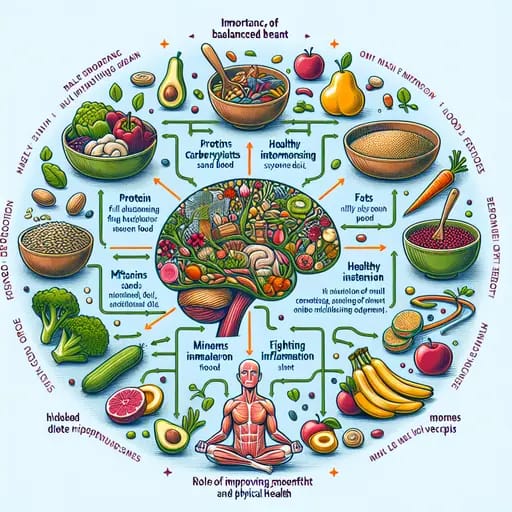
Nutrition and Diet: Fueling Your Body and Mind for Optimal Health
Welcome to the core cornerstone of wellness: nutrition and diet. This fundamental element of overall health serves as the primary fuel for both our mental and physical functioning. Let’s dive into the significance of maintaining a balanced diet and how it influences our wellbeing.
The Importance of Balanced Nutrition
Feeding your body with the right nutrients is no less than fueling a car for its optimal performance. A balanced diet is essential for:
- Physical Health: It helps maintain a healthy weight, reduce the risk of chronic diseases, and promote overall health.
- Mental Health: The nutrients from a well-rounded diet aid in the functioning of our brains, affecting our emotions and impulses.
Components of a Balanced Diet
A nutritious and balanced diet comprises primarily of the following elements:
- Proteins: Supports brain function and serves as a building block for bones, muscles, skin, and blood.
- Carbohydrates: The primary source of energy for the body, including the brain and muscles during exercise.
- Fats: Crucial for brain development, managing inflammation, and supporting cell growth.
- Vitamins and Minerals: Essential in boosting the immune system, supporting normal growth and development, and helping cells and organs do their jobs.
- Fiber: Promotes a healthy digestive system and offers other important health benefits.
Adapting a balanced approach to nutrition is not just about eating the right foods, but also consuming them in the right quantities and the right times.
The Mind, Mood, and Food Connection
Did you know that what you eat also influences your mood and mental wellbeing? Foods rich in B vitamins such as B12 and folates are known to boost mood and are essential elements of a brain-healthy diet. These include whole grains, legumes, fruits, and vegetables, which are integral components of a balanced diet, fueling your body and mind for optimal health.
To wrap it up, prioritizing a well-rounded diet isn’t just beneficial for your physical health but also plays a significant role in promoting mental wellness. As quoted succinctly by Hippocrates, “Let food be thy medicine”; the traditional, nutrient-dense foods we consume can indeed serve as a powerful tool for preserving and enhancing our overall wellness.
In our next section, we will explore “The Role of Exercise in Improving Mental Health and Physical Wellbeing“, so stay tuned!
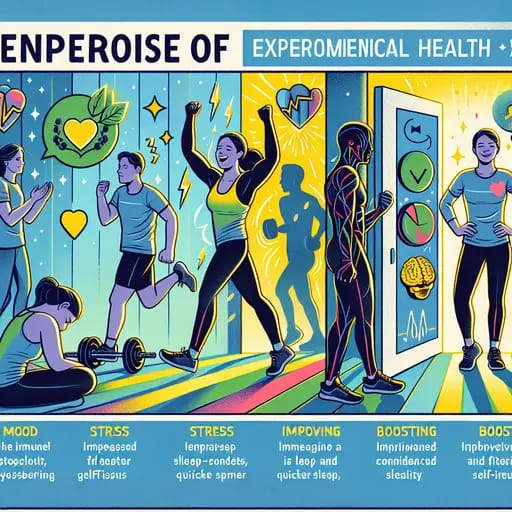
The Role of Exercise in Improving Mental Health and Physical Wellbeing
The importance of exercise for both physical and mental health cannot be overemphasized in the journey towards holistic wellness. Regular physical activity is not just beneficial for a healthy body, but it also molds a resilient mind. Let’s dive into the pivotal role of exercise in comprehensive health and wellness:
1. Enhances Mood and Alleviates Stress:
- Exercise releases endorphins, also referred to as ‘feel good’ hormones which boosts mood and combats feelings of anxiety and depression.
- Physical activity acts as a natural stress reliever, reducing levels of stress hormones like adrenaline and cortisol, while stimulating the production of mood-enhancing endorphins.
2. Boosts Physical Health:
- Regular exercise helps maintain a healthy weight, strengthens the cardiovascular system, and boosts the immune system. It enhances muscle tone and body strength, and provides the body with greater energy.
- It’s also integral in preventing chronic diseases such as heart disease, diabetes, and arthritis, among others.
3. Improves Sleep and Mental Clarity:
- Exercise contributes to better sleep quality by helping you fall asleep faster and deepening your sleep. Good quality sleep further enhances mental clarity and cognitive functions.
- Physical activity promotes the growth of new brain cells and increases brainpower, improving memory, concentration, and problem-solving skills.
4. Builds Confidence and Self-Esteem:
- Physical fitness can boost self-esteem and improve positive self-image. Regular workout can improve perception of attractiveness and self-worth, enhancing overall mental wellbeing.
In conclusion, the integration of regular exercise and physical activity into daily routine is fundamental to holistic approaches for mental and physical wellness. It interacts with multiple aspects of our lives – from mood regulation and stress relief, to nurturing our mental abilities and fostering physical health. Therefore, exercise plays a significant role in improving overall health and embracing a better quality of life.

Holistic Approaches to Stress Management: Techniques for Relaxation and Resilience
In our ever-busy world, stress has become a common part of daily life. However, chronic stress can be harmful to both your mind and body. Holistic stress-management techniques aim to provide tools for handling stress in a healthier, more balanced way. Here, we’ll explore several effective strategies to cultivate inner calm and resilience.
1. Mindfulness-Based Stress Reduction
Leveraging the power of being present, Mindfulness-Based Stress Reduction (MBSR) equips us with the ability to handle stress as it arises. This practice involves cultivating awareness of your mind and body and your environment in the present moment. This helps decrease preoccupation with regrets, worries, or fears about the future.
2. Yoga and Meditation
Both yoga and meditation have been shown to reduce stress levels. Yoga combines physical postures, breathing exercises, and meditation to boost physical and mental health. Meditation, meanwhile, focuses on training attention and awareness to achieve mental clarity and emotional stability.
- Yoga increases flexibility, promotes relaxation, and improves mental clarity.
- Meditation fosters a state of relaxation and tranquility that can reduce stress.
3. Aromatherapy
This practice uses aromatic essential oils to improve the health of the body, mind, and spirit. Essential oils such as lavender, chamomile, and bergamot are renowned for their stress-relieving properties. Aromatherapy can be particularly beneficial as part of a nightly routine to promote restful sleep.
4. Nutrition
A balanced diet is essential for managing stress and promoting overall wellness. Certain foods, like those rich in vitamin C, omega-3 fatty acids, and magnesium, may help reduce stress levels.
5. Exercise
Physical activity boosts production of your brain’s feel-good neurotransmitters, endorphins, often resulting in the “runner’s high” and a positive, energizing outlook on life. It’s a potent stress reliever.
In Conclusion
Managing stress is an important part of holistic wellness. By including mindfulness practices, yoga, aromatherapy, a balanced diet, and regular physical activity in your routine, you can develop a holistic approach to managing stress. Remember, everyone is different and what works for one person may not work for another. It’s important to find the techniques that work best for you.

The Importance of Quality Sleep for Mental Clarity and Physical Recovery
In a holistic approach to wellness, and for the pursuit of a balanced and healthy life, quality sleep is indisputably essential. It’s an often overlooked but integral part of maintaining both mental clarity and physical recovery. Understanding this relationship will undoubtedly lead to a deeper appreciation for the role of sleep in comprehensive health. Let’s delve into why sleep is such a critical player in our overall wellbeing.
Sleep and Mental Clarity
- Mood regulation: Poor quality sleep or lack of sleep can lead to mood fluctuations, irritability, and emotional instability. Quality sleep, on the other hand, fosters emotional resilience.
- Cognitive functions: Sleep is crucial for cognitive processes such as memory, creativity, and problem-solving. By getting regular, quality sleep, we can boost our cognitive functions and mental clarity.
- Lower risk of mental health disorders: Studies show that chronic sleep disruptions can put individuals at a higher risk for developing mental health disorders such as depression and anxiety.
Sleep and Physical Recovery
- Restoration of body functions: Our bodies undergo necessary restoration work while we’re sleeping. From muscle growth to tissue repair, sleep serves as nature’s best healer.
- Boosted Immunity: A good night’s rest can improve your body’s ability to fight off illnesses and infections, thus boosting your immune system.
- Longevity: Regular quality sleep can reduce aging effects, and contribute to a generally healthier and longer life.
The correlation between quality sleep and holistic wellness indicates the vital role a good night’s rest plays in our lives. Through regular, quality sleep, we can enhance our mental acuity, promote physical recovery and enjoy the ensuing health benefits. It is imperative to prioritize sleep as it is the basis of mental clarity and physical recovery in any holistic approach to wellness.
By understanding and prioritizing sleep, we can cultivate healthier habits that conduce to a more balanced and healthier life. Therefore, the journey towards holistic wellbeing is incomplete without recognizing, respecting, and meeting our sleep needs.
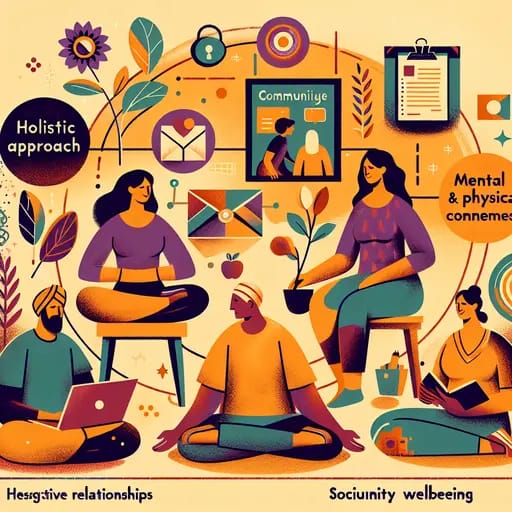
Supportive Relationships and Community: Nurtifying Your Social Wellbeing
Embracing the holistic approach to mental and physical wellness is incomplete without recognizing the vital role that supportive relationships and community play in our overall wellbeing. Nurturing our social wellbeing is not just about having friends and family around. It’s more about the quality of these relationships and our sense of belonging in the community. Let’s understand how we can nurture supportive relationships and feel more connected with our community.
Quality Over Quantity: The Importance of Supportive Relationships
Having numerous friends or a large family doesn’t necessarily translate to better social wellbeing. The essence lies in having people who genuinely care about us, listen to us, and provide emotional support when needed. Some ways to nurture quality relationships include:
- Maintaining regular communication, either in person or virtually.
- Spending quality time together, partaking in shared hobbies or interests.
- Regularly expressing appreciation and love.
- Offering support during challenging times and celebrating successes together.
The Community Connection: Building a Sense of Belonging
Community plays a major role in fostering a sense of belonging. Feeling that you are part of something larger instills a sense of security and helps combat feelings of loneliness and isolation. Here are some suggestions to build a stronger community connection:
- Engage in local events or volunteer work to make new connections and contribute positively to the community.
- Join local clubs or interest groups to share common passions and interests.
- Show kindness and respect towards all community members, regardless of their differences.
How Nurturing Relationships and Community Enhances Mental and Physical Wellness
Investing in our social wellbeing contributes significantly to our overall health. Here are some key points that link strong relationships and community connections to better mental and physical wellness:
- Emotional support can help mitigate stress and anxiety, promoting better mental health.
- Positive social interactions can boost our mood and provide a sense of happiness and satisfaction.
- Strong, supportive relationships can encourage healthier lifestyle habits such as regular exercise, balanced diet, and adequate sleep.
- Community connection fosters a sense of security, reducing worries and promoting mental calm.
In essence, a holistic approach to mental and physical wellness acknowledges the interconnectedness of our body, mind, and social world. Don’t neglect your social wellbeing, as it serves as a vital component to a balanced and healthy life.
Keywords:
- holistic approach
- mental and physical wellness
- supportive relationships
- community connection
- social wellbeing

Conclusion: Embracing Holistic Approaches for a Balanced and Healthy Life
As we wind up our exploration into the holistic approaches to mental and physical wellness, it is crucial to understand that our journey to optimal health is not a destination, but a continuous pursuit. Embracing a holistic approach propels us into a multi-faceted journey that focuses on nurturing our mind, body, and spirit together. Harmony and balance in these dimensions hold the key to a vibrant, fulfilling, healthy life.
- Embrace mindfulness practices: From the benefits of meditation and yoga, we’ve learned the power of aligning mind and body. This not only improves our mental wellness but also reinforces the mind-body connection vital in our wellness journey.
- Nutrition and diet: Supplying our body with essential nutrients fuels biological functions, supports mental clarity, and fosters physical strength. A balanced diet is vital in our quest for holistic wellness.
- Regular exercise: As we’ve seen, incorporating regular exercise into our routine aids in stress management, lifts our spirit, and fosters physical well-being.
- Stress management: Better equipped to handle life’s stresses and react to events with resilience, we will enjoy improved mental health.
- Quality sleep: Increases mental clarity and provides physical recovery, ensuring our bodies are well-rested, well-healed, and rejuvenated every morning.
- Nurturing relationships: Fostering strong social connections and a sense of belonging is the essence of holistic health and longevity.
As we step into the realm of holistic approaches to mental and physical health, we realize that every step of the journey requires discipline, intense learning, and consistency. But the rewards—enhanced mental clarity, physical vitality, improved relationships, and an improved sense of overall well-being—are definitely worth the effort.
To conclude, holistic wellness goes beyond the absence of illness. It is about living a balanced, fulfilling and healthy life. We hope this article has shed more light on holistic approaches to mental and physical wellness and inspires you to embrace a life of health, harmony, and balance.
















